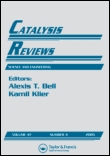
CATALYSIS REVIEWS-SCIENCE AND ENGINEERING
Scope & Guideline
Elevating Standards in Catalysis Research and Reviews
Introduction
Aims and Scopes
- Catalytic Mechanisms and Reaction Pathways:
The journal emphasizes the exploration of catalytic mechanisms and the detailed pathways of reactions, often focusing on the molecular and atomic-level interactions that govern catalytic processes. - Sustainable and Green Catalysis:
A core focus is on sustainable catalytic processes that minimize environmental impact, including the development of catalysts for biomass conversion, CO2 utilization, and other renewable feedstocks. - Advancements in Catalytic Materials:
The journal showcases innovative materials used in catalysis, such as nanostructured materials, biocatalysts, and metal-organic frameworks, highlighting their synthesis, characterization, and application. - Electrocatalysis and Photocatalysis:
A significant area of interest is the development of catalysts for electrochemical and photocatalytic processes, with a focus on energy conversion and pollutant degradation. - Machine Learning and Computational Catalysis:
The integration of machine learning and computational methods in catalyst design and optimization is increasingly prominent, allowing for predictive modeling and enhanced understanding of catalytic systems.
Trending and Emerging
- Electrocatalytic CO2 Reduction:
There is a growing interest in electrocatalytic processes for CO2 reduction to valuable chemicals, driven by the need for carbon neutrality and sustainable energy solutions. - Biocatalysis and Enzymatic Reactions:
The application of biocatalysts and enzyme-based reactions is on the rise, particularly in the context of green chemistry and sustainable production of chemicals. - Machine Learning in Catalysis:
The increasing use of machine learning techniques to predict and optimize catalytic performance is emerging as a significant trend, facilitating the design of novel catalysts and reaction pathways. - Nanostructured and Two-Dimensional Catalysts:
Research on nanostructured materials, including two-dimensional materials like graphene and transition metal dichalcogenides, is gaining momentum due to their unique properties and potential applications in catalysis. - Catalytic Processes for Wastewater Treatment:
Emerging themes include the development of catalytic processes aimed at treating wastewater and removing contaminants, which is increasingly critical in environmental catalysis.
Declining or Waning
- Traditional Homogeneous Catalysis:
There has been a noticeable decrease in reviews focusing on traditional homogeneous catalysis, as more emphasis is placed on heterogeneous and biocatalytic systems that offer greater sustainability and efficiency. - Classic Metal Catalysts:
Research on classical metal catalysts, particularly those based on noble metals without innovative approaches or modifications, appears to be waning. The field is moving towards more sustainable and earth-abundant metal catalysts. - Thermal Catalysis without Green Considerations:
The focus on thermal catalytic processes without integrating green chemistry principles is diminishing, as the community increasingly prioritizes environmentally friendly methodologies. - Conventional Organic Synthesis Techniques:
Topics centered around conventional organic synthesis methods are less frequently reviewed, as the field shifts toward more innovative and efficient catalytic approaches that offer higher selectivity and lower environmental impact.
Similar Journals

APPLIED CATALYSIS A-GENERAL
Transforming Ideas into Catalytic Solutions.Applied Catalysis A-General is a premier journal published by Elsevier that serves as a vital resource in the fields of catalysis, process chemistry, and technology. Founded in 1991, this esteemed journal has garnered considerable recognition, reflected in its classification in the Q2 quartile for both catalysis and process chemistry in 2023, as well as its notable rankings within the Scopus database, placing it among the top 20 journals in related disciplines. With an ISSN of 0926-860X and an E-ISSN of 1873-3875, the journal provides a platform for researchers and professionals to disseminate cutting-edge research findings, facilitate knowledge transfer, and foster innovation in the field. While not an open-access journal, it remains accessible through institutional subscriptions, ensuring that critical findings reach a broad audience. The journal's objectives include advancing the understanding of catalytic processes and their applications, making it an indispensable tool for those engaged in this dynamic area of study. Applied Catalysis A-General continues to play a vital role in shaping the future of catalysis, contributing to both scientific progression and practical advancements in various industries.
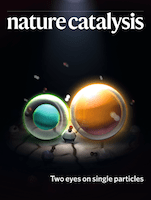
Nature Catalysis
Transforming Ideas into Impactful Catalytic SolutionsNature Catalysis is a premier academic journal published by NATURE PORTFOLIO, specializing in the rapidly evolving fields of biochemistry, bioengineering, and catalysis. With its ISSN of 2520-1158, this journal has emerged as an invaluable resource since its inception in 2018, contributing significantly to interdisciplinary research. Recognized for its high impact within the scientific community, it holds a prestigious Q1 ranking across multiple categories, including Biochemistry, Process Chemistry and Technology, and Catalysis as of 2023, illustrating its influence and authority in the field. Researchers will find impactful articles characterized by rigorous peer review processes that push the boundaries of knowledge in catalysis and its applications. While the journal operates with traditional access models, it remains accessible to a global audience interested in innovative research findings that promise to shape future developments in these critical areas. Positioned at the forefront of contemporary scientific inquiry, Nature Catalysis invites contributions that expand upon catalytic processes and technologies, which are crucial for advancing both fundamental science and applied engineering.

RESEARCH ON CHEMICAL INTERMEDIATES
Unveiling Breakthroughs in Chemical ScienceRESEARCH ON CHEMICAL INTERMEDIATES, published by Springer, is a prestigious academic journal that has been contributing to the field of chemistry since 1984. With an ISSN of 0922-6168 and an E-ISSN of 1568-5675, this journal serves as a vital platform for the dissemination of innovative findings and research advancements related to chemical intermediates. Situated in the Netherlands, it has established a commendable reputation, currently ranked in the Q2 category for miscellaneous chemistry and positioned at #131/408 with a 68th percentile in the Scopus rankings. Though it does not operate under an open-access model, the journal plays a crucial role in connecting scientists, researchers, and practitioners to facilitate a better understanding of synthetic methods, characterizations, and applications of various chemical intermediates. Continually publishing high-quality research until its anticipated convergence in 2024, this journal is an essential resource for those looking to expand their knowledge and contribute to the vibrant community of chemical science.
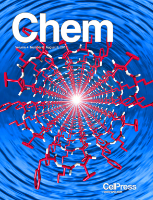
Chem
Fostering Interdisciplinary Dialogue in ChemistryChem, published by CELL PRESS, is a renowned academic journal that has rapidly established itself as a leading platform for cutting-edge research in diverse areas such as biochemistry, chemical engineering, materials chemistry, and environmental chemistry. Released under the ISSN 2451-9294, this esteemed journal has achieved an impressive Q1 category ranking across multiple disciplines in 2023, highlighting its significant impact and prominence within the academic community. With a strong focus on innovative studies and interdisciplinary approaches, Chem fosters a vibrant dialogue among researchers, professionals, and students, making it an indispensable resource for those seeking to advance their knowledge and contribute to the evolving field of chemistry. As an open access journal, it aims to democratize knowledge, ensuring that critical research is accessible to a global audience. With its headquarters based in Cambridge, MA, it continues to lead the charge in the dissemination of pivotal findings that shape our understanding of chemical sciences.

JOURNAL OF CHEMICAL SCIENCES
Fostering Collaboration in the World of Chemical SciencesThe JOURNAL OF CHEMICAL SCIENCES, published by the Indian Academy of Sciences, is a premier academic journal that serves the global community of chemists and researchers. With an ISSN of 0974-3626 and an E-ISSN of 0973-7103, this journal is pivotal in disseminating high-quality research across diverse areas of chemical sciences. As of 2023, it holds a respectable Q3 ranking in the field of Chemistry (miscellaneous) and ranks #215 out of 408 in General Chemistry according to Scopus, reflecting its commitment to advancing the discipline. Operating in an open-access format, the journal ensures that research findings are readily accessible to a broader audience, fostering collaboration and innovation. Established in 1980 and continuing to evolve, the journal's scope encompasses fundamental and applied chemistry, and aims to bridge gaps between theoretical and practical applications. With a mission to support the scientific community, the JOURNAL OF CHEMICAL SCIENCES is an essential resource for researchers, professionals, and students alike, providing a platform for the exchange of groundbreaking ideas and discoveries.

CCS Chemistry
Elevating the Dialogue in Chemistry Through Open ScholarshipCCS Chemistry, published by the esteemed Chinese Chemical Society, is a leading open-access journal dedicated to advancing the field of chemistry. Since its inception in 2019, the journal has rapidly gained recognition, achieving a remarkable impact factor that places it in the prestigious Q1 category in Chemistry (Miscellaneous) as of 2023. With a Scopus ranking of #41 out of 408 in General Chemistry, CCS Chemistry represents the top 10th percentile in its category, reflecting its commitment to high-quality research and innovation. The journal serves as a vital platform for researchers and professionals to share their findings, showcase cutting-edge methodologies, and engage with the latest developments in various chemistry subfields. Accessible to a global audience, CCS Chemistry ensures that groundbreaking research is available without barriers, making it an indispensable resource for students and academics aiming to stay at the forefront of chemical sciences. For further details, submissions, and access to published articles, please visit the journal's website.

Reactions is a dynamic open-access journal published by MDPI, dedicated to the advancement of research in the fields of Chemical Engineering and Chemistry. Launched in 2020, the journal aims to provide a platform for scientists and researchers to share their findings and innovations, facilitating the synthesis and dissemination of knowledge within the global academic community. With an impact factor that reflects its growing influence, Reactions ranks 47th in the Chemical Engineering category and 72nd in Chemistry on Scopus, placing it within the vibrant landscape of contemporary chemical research. Housed in the picturesque city of Basel, Switzerland, the journal is committed to open access, ensuring that its high-quality content is readily available to all. This commitment not only enhances visibility but also fosters collaboration among researchers, professionals, and students striving to push the boundaries of chemical sciences. As we look towards 2024 and beyond, Reactions continues to encourage submissions that explore groundbreaking methodologies, innovative applications, and transformative theoretical frameworks in chemistry and chemical engineering.
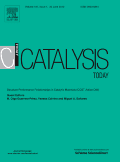
CATALYSIS TODAY
Exploring Breakthroughs in Catalytic ScienceCATALYSIS TODAY is an esteemed journal published by Elsevier, specializing in the vibrant field of catalysis and its applications in chemical engineering. With the ISSN 0920-5861 and E-ISSN 1873-4308, it has continually contributed valuable research since its inception in 1987 and is set to maintain its influence through 2025. Hailing from the Netherlands, this journal stands out with a notable Q2 quartile ranking in catalysis and a Q1 ranking in miscellaneous chemistry as of 2023, reflecting its rigorous selection of impactful and innovative studies. Its Scopus rankings further substantiate its excellence, highlighting its position in the 89th percentile of general chemistry and 77th percentile in catalysis. CATALYSIS TODAY aims to disseminate cutting-edge findings, fostering exchange among researchers, professionals, and students in the catalysis community. By presenting high-quality research articles, reviews, and case studies, it plays a pivotal role in advancing knowledge and sparking discussions that drive future developments in the field.
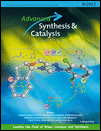
ADVANCED SYNTHESIS & CATALYSIS
Empowering researchers to transform chemical processes.ADVANCED SYNTHESIS & CATALYSIS is a prestigious academic journal published by Wiley-VCH Verlag GmbH, based in Germany. This journal, with ISSN 1615-4150 and E-ISSN 1615-4169, plays a pivotal role in the fields of Chemistry and Chemical Engineering, earning commendable rankings such as Q2 in Catalysis and Q1 in Organic Chemistry in 2023. Its high impact factor and recognition—ranking #18 in both Organic Chemistry and Catalysis—further underscore its significance as a platform for groundbreaking research and innovative methodologies. Spanning from 1996 through 2024, ADVANCED SYNTHESIS & CATALYSIS aims to disseminate high-quality, cutting-edge studies related to synthetic processes and catalytic technologies, ensuring accessibility via their open access options. By fostering a vibrant scholarly community, this journal serves as an essential resource for researchers, professionals, and students dedicated to driving advancements in synthetic and catalytic chemistry.
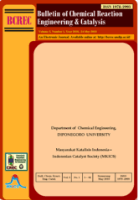
Bulletin of Chemical Reaction Engineering and Catalysis
Pioneering Research in Catalysis and Reaction EngineeringBulletin of Chemical Reaction Engineering and Catalysis is a distinguished open-access journal published by UNIV DIPONEGORO, focusing on pivotal advancements in the fields of chemical reaction engineering and catalysis. Since its inception in 2008, this journal has served as a vital platform for disseminating cutting-edge research, catering to a diverse readership that includes researchers, professionals, and students in chemical engineering and related disciplines. With its dedication to publishing valuable insights, the journal has been indexed in Scopus and boasts respectable rankings across various categories, including Q3 in Chemical Engineering (miscellaneous) and Q4 in Catalysis as of 2023. It continues to foster scholarly dialogue and collaboration by providing an accessible means for contributors to share their findings. Operating from Semarang, Indonesia, this journal underscores its commitment to advancing knowledge in chemical sciences, making it an essential resource for those engaged in the study and application of chemical processes.